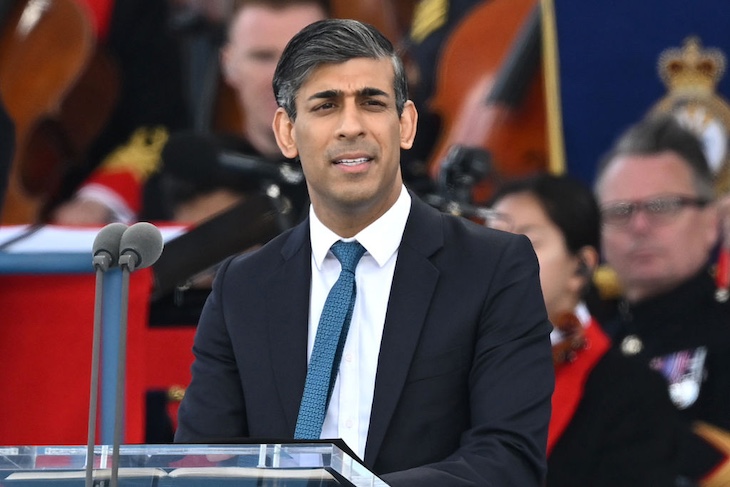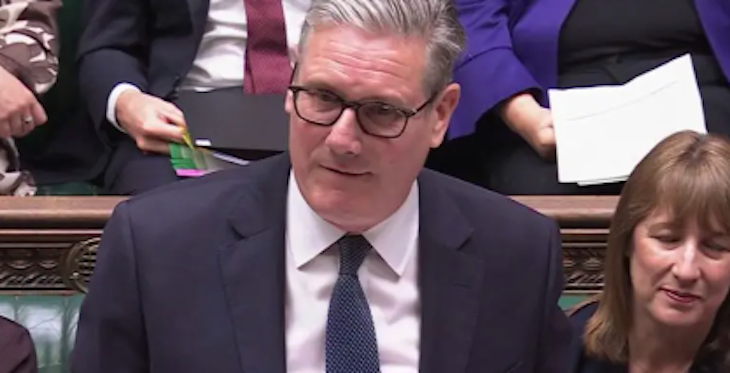Rishi Sunak’s decision to leave Thursday’s 80th anniversary commemoration of D-Day in Normandy was extraordinary, stupid and disrespectful. He accompanied the King to a British ceremony at Ver-sur-Mer in the morning, at which Sir Keir Starmer, the leader of the opposition, was also present. But Sunak returned to the UK before the afternoon’s international event at Omaha Beach. It transpired that he spent the rest of the day recording an election campaign interview with ITV.
Failing to attend a major commemoration of one of the most important events in recent history, during which 1,500 British service personnel were killed, is staggeringly disrespectful
Downing Street sources have since told the BBC that the itinerary for 6 June was finalised several weeks ago, and that it had never been part of the plan for the prime minister to attend the Omaha Beach ceremony. Last month, the French government told the BBC that ‘Rishi Sunak’s presence is not guaranteed at the international ceremony, as the British ceremony will be held beforehand.’
Sunak’s defence, therefore, is that this was not an unplanned decision, nor was the interview with ITV a factor in the timing. Even if this turns out to be wholly truthful and accurate, it is the very definition of a technicality, and misses the point by a country mile.
Failing to attend a major commemoration of one of the most important events in recent history, during which 1,500 British service personnel were killed, is staggeringly disrespectful. Sunak was missing at a ceremony which US President Joe Biden, President Emmanuel Macron of France, the chancellor of Germany Olaf Scholz, President Volodymyr Zelenskyy of Ukraine and more than a dozen other heads of state and government had made time for. Let us be unmistakably clear: if that is the list of attendees, no British prime minister has a pressing need to be elsewhere.
The prime minister’s absence was made more glaringly obvious by the fact that the UK was represented by the foreign secretary, Lord Cameron of Chipping Norton, who was photographed with Biden, Macron and Scholz. When Cameron returned to government late last year, some saw it as an admission by Sunak that the PM was uninterested in international relations, and there was anxiety that he might be overshadowed and diminished by his experienced predecessor. It was quickly being said in the Foreign Office that Cameron was effectively the ‘foreign affairs PM’.
The undoubted insult of an early departure was exacerbated by the fact that Sunak returned to London to record an explicitly political campaigning interview with ITV. The full encounter will not be screened for some days but clips released by the broadcaster show that the prime minister was defending his claim in this week’s televised election debate that a Labour government would raise taxes by £2,000 per household. The opposition have called the accusation a lie and the Treasury’s most senior civil servant has disavowed it. This contrast between the highs of international statecraft and the low of bare-knuckle electoral scrapping is stark and offensive.
The row is also, quite simply, stupid. The Conservative party had used the anniversary of D-Day to unveil a new range of policies to support armed forces veterans. Sunak has so far leaned heavily on an image of a patriotic leader who can be trusted with the nation’s security, in supposed contradistinction to Starmer. This furore has, at best, cancelled any benefit to be accrued from that. It also allowed the Labour leader to shake his head sadly at the prime minister’s apparent lack of commitment, and he told reporters ‘For me, there was nowhere else I was going to be.’ A bonus was Starmer being photographed with President Zelenskyy of Ukraine, reinforcing the Labour leader’s image as a substantial figure and premier in waiting.
Beyond that, this farce speaks of a deeper malaise. Nothing in politics happens in isolation: not only did the Prime Minister act in a foolish and disrespectful way, but several advisers must have signed off on his plans and if anyone raised an objection or even a suggestion that there might be reputational damage, it was not enough to force a change of plan. This is not Malcolm Tucker-level three-dimensional chess. An intern on his or her first day should have grasped intuitively that this looked dreadful. This forces us to one of two conclusions, neither of them good. Either the prime minister is being poorly advised, or he is not listening to his advisers.
Sunak has grudgingly apologised for Thursday’s absence, tweeting that ‘On reflection, that was a mistake and I apologise’. Disgracefully, however, he continued, ‘I think it’s important, though, given the enormity of the sacrifice made, that we don’t politicise this. The focus should rightly be on the veterans who gave so much.’
A thoughtless mistake became politicised the moment the prime minister sat down in front of ITV’s cameras on Thursday. It beggars belief that he is now trying to scramble towards the moral high ground. This was a massive error of judgement. Sunak, like any politician, cannot undo his actions, but he can and should be contrite.








Comments